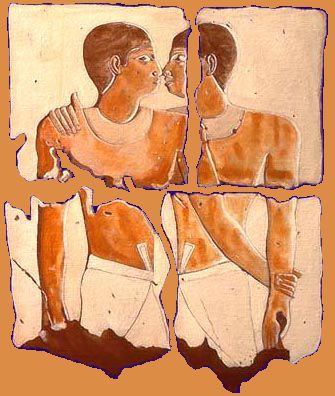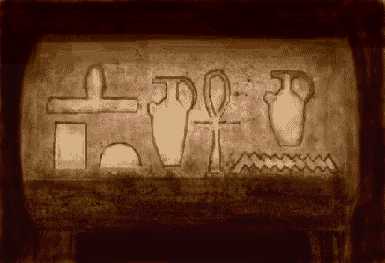
![]()
HONR 490: Honors Seminar
"The Love that Dare Not Speak Its Name":
Introduction to Lesbian/Gay/Bisexual/Transgender Studies
![]()
490H Requirements | 490H Syllabus
Image Credit: "Niankhkhnum and Khnumhotep," adapted from carving in Fifth Dynasty Egyptian tomb in which two men are laid to rest, surrounded by images that celebrate their intimate bond in life and their union in death.
http://www.sirius.com/~reeder/niankh.html.Course Description
This course offers an introduction to the interdisciplinary field of Lesbian/Gay/Bisexual/Transgender Studies from an historical and multicultural perspective. We will use theory, literature, and film to explore sex and sexuality as fundamental categories of analysis in the humanities. We will draw upon a wide variety of disciplines--including history, anthropology, sociology, African American studies, ethnic studies, women's studies, literary studies, and cultural studies. Likewise, we will examine texts from a number of cultures and historical eras to appreciate the diversity, rather than the homogeneity, of sexual experiences, practices and identities as well as the cultural meanings attached to various forms of sexuality. A question that we will examine throughout the semester is one raised by Eve Kosofsky Sedgwick in her groundbreaking book, The Epistemology of the Closet: What was the structure, function, historical/cultural context, and signification of same-sex intimacy in the historical moment that produced the text, artifact or practice we are examining? Our focus will move beyond the academy to consider questions of social activism, lesbian/gay identities and communities, and civil rights.

Through critical reading of theoretical and literary texts, small and large group discussions, and student presentations on particular "focus issues," we will work collaboratively toward a knowledge of LGBT Studies, its central concerns, and its various methods of inquiry. The course stresses a high degree of student involvement in, and responsibility for, the teaching and learning that will occur. Together, as a community of teacher/learners, we will shape the course to meet the diverse needs and interests of the group.
Image credit: Names of Niankhkhnum and Khnumhotep inscribed in hieroglyphics as one name on wall of their tomb.
http://www.egyptology.com/niankhkhnum_khnumhotep/names.htmlRequired Texts
Abelove, Henry, et al. The Lesbian and Gay Studies Reader. New York: Routledge, 1994.
Allison, Dorothy. Bastard Out Of Carolina. New York: Plume, 1992.
Anzaldua, Gloria. Borderlands/La Frontera. San Francisco: Aunt Lute, 1987.
Baldwin, James. Giovanni's Room. New York: Dell, 1956
Duberman, Martin, et al. Hidden From History. New York: Meridian, 1989.
Feinberg, Leslie. Stone Butch Blues. Ithaca, NY: Firebrand, 1993.
Forster, E. M. Maurice. New York: Norton, 1971.
Leavitt, David. The Lost Language of Cranes. New York: Bantam, 1986.
Lorde, Audre. Zami. Freedom, CA: The Crossing Press, 1982.
Monette, Paul. Borrowed Time. New York: Avon, 1989.
Queer Resources Directory. Http://www.qrd.org/QRD/
White, Edmund. A Boy's Own Story. New York: Plume, 1982.
Winterson, Jeanette. Oranges Are Not the Only Fruit. New York: Atlantic Monthly, 1985.
---. Written On The Body. New York: Vintage, 1992.
Woolf, Virginia. Mrs. Dalloway. New York: Harcourt Brace, 1925.
Course Policies
Attendance and Participation:
Regular attendance and thoughtful participation in class discussion are essential not only to your individual performance, but also to the success of this course. Our work together relies on collaboration in every phase of the course so that we might form an intellectual community whose insights and power surpass those of any one of us working on our own. We are all subjects who share the responsibilities of teaching and learning in this class. Each of us has a responsibility to the group and to the learning that goes on in class.
Since we meet only once a week, even a single absence significantly diminishes your opportunity to share in the teaching and learning in this course. Therefore, more than 1 absence will affect the final grade adversely; more than 3 absences will result in automatic failure of the course.
Contract Grading:
I would like to use a system of contract grading and self-assessment for each activity in the course. If you do not wish to choose this option for grading you do not have to do so, and you may receive grades in the conventional way. It is my hope that contract grading will afford you a higher degree of participation in every phase of the course, including those ordinarily reserved for the "teacher." The success or failure of this course depends much more on you as teacher than on me. Each of us is a teacher in this course, and each a learner. And that role cannot suddenly shift at evaluation time. Therefore, I am inviting each of you to contract for the grades you feel you can reasonably work toward in each of the course activities, and to complete a self-assessment of each activity as part of the contract.
For each of the course activities, I will distribute a contract describing the criteria for each letter grade. I will distribute the contract for each activity when I give you the invitation for that task. When you submit each activity, include the contract stipulating the grade for which you have contracted along with a self-assessment of your work in which you offer a specific and detailed explanation of how your work meets each of the criteria for the level of performance for which you are contracting.
If you do not wish to contract for a grade in course activities, please let us know that and we will use conventional grading methods for your work.
Late Work:
I do not accept late work. If you are absent the day a log is collected, you must arrange with your log partner to read and respond to his or her log and to have him or her respond to your log; on the day you return to class, you must return your partner's log and get your log back.
Academic Honesty:
All faculty are requested to distribute the following statement of the University Honor Code:
"By accepting admission to Radford University, each student makes a commitment to understand, support, and abide by the University Honor Code without compromise or exception. violations of academic integrity will not be tolerated. This class will be conducted in strict observance of the Honor Code. Please refer to your Student Handbook for details."
Plagiarism, including the use of work submitted to another course without the consent of both instructors, the use of work by another person, or the use of someone else's words, ideas, or arrangement of argument without giving proper reference to the author, is a serious violation of the Honor Code. Please see the section on plagiarism in your Student Handbook. Be especially careful, as you complete your research essay, that you do not use the ideas of others without giving them credit even if you do not use direct quotations. You must give credit to a writer when you paraphrase his or her ideas. This includes all sources from the World-Wide Web and any electronic sources in the library.
![]()
Home Page | 490H Requirements | 490H Syllabus | Course Descriptions and Syllabi